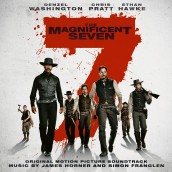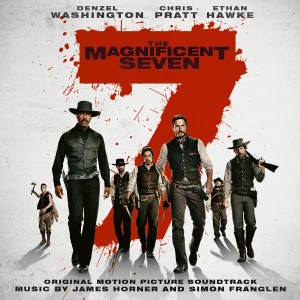
THE MAGNIFICENT SEVEN soundtrack | ©2016 Sony Classical Records
Few fans were aware of James Horner’s taste for daredevil thrills that made the soft-spoken composer rival just about any of the action heroes he scored. When Horner’s plane crashed into the desert far outside of Hollywood, a legion of admirers were at first astonished to find out how he perished, then swiftly overcome by the shockwave of just what the sudden loss of one of modern film scoring’s most notable signature voices meant. For where so many of Horner’s compatriots had fallen to the wayside over the decades when he first came to the fore, Horner had been on a steady ascent in recent years, especially with the robustly heroic score of THE AMAZING SPIDER-MAN and the dark, gritty electronic score to SOUTHPAW. Now aside from a few concert and ballet works yet to be released, it seemed that it was all over, a tragedy given that SOUTHPAW, director Anton Fuqua’s next movie was an all-star remake of a remake of THE MAGNIFICENT SEVEN. Then, like some impossible sighting of a phoenix, it was announced that Horner had indeed written themes for the western. When listening to the spectacular results, one might assume that Horner himself had risen from the desert ashes for one last, glorious gallop into the sunset, with an utterly complete, complex score that summed up all of the bells and whistles of a signature, singular career.
However, if there’s a real hero who deserves to have his name emblazoned after THE MAGNIFICENT SEVEN musically ride again, then it’s Simon Franglen. The Chris Pratt to Horner’s Denzel, Horner’s long-time man of action has lassoed a collection of themes from potential oblivion into a powerhouse example of he-man vengeance and righteousness, sweeping into an evil-soaked town with brassy, blazing melodies, robust ethnicity, echo-plexing trumpets, myth-making voices and all the glorious fury of a western super team’s last stand. Even if the iconic theme of Elmer Bernstein, that other ghost that hovers over these SEVEN, might not have that melody present here, his Jedi spirit is standing alongside Horner – and how. An accomplishment on many levels, let alone for making one believe in the power of musical resurrection, the yeoman determination of Franglen and Horner’s saddlemates have created a tribute unlike any other.
Yet Simon Franglen’s certainly been his own musical man, working as a synthesist who’s graced the work of Alan Silvestri (THE BODYGUARD) and Thomas Newman (SPECTRE) and a song producer that received accolades for TITANIC‘s “My Heart Will Go On” and “Avatar’s” “I See You.” Franglen’s own voice will rise to the heavens indeed with his forthcoming score for musically esoteric director Terrence Malick’s Imax documentary “Voyage of Time.” But right now, we can revel as Franglen rousingly shoots the flaming arrow into a western Viking funeral as the co-composer of THE MAGNIFICENT SEVEN succeeding against all odds in a way that any outmatched gunslinger would certainly admire.
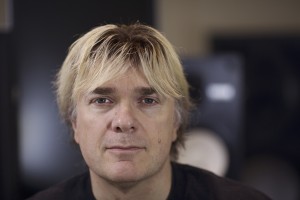
THE MAGNIFICENT SEVEN co-composer Simon Franglen | ©2016 Simon Franglen
ASSIGNMENT X: Could you tell us about your musical background?
SIMON FRANGLEN: Start with Bach and Beethoven from birth, introduce a teenage blast of The Damned’s “New Rose,” bring in a side of “Dr. Mabuse” and liberally sprinkle some “Snowflakes are Dancing” and “Wardance” and you’ve got my youth! I came from a family where classical music was an important part of our lives and since my great-uncle Hans Keller was one of the bastions of what became Radio 3 in Britain, we were immersed in music.
After time at university doing no work but spending too many nights in the Haçienda, I jumped into recording studios just at the birth of the first digital samplers and sequencers. I got spotted early as having some talent with them and was hired by Trevor Horn to act as his Synclavier programmer, which was an experience and a half. After working on bands like Yes, there came a point where I decided to leave and went freelance.
AX: What drew you to being a part of the world of film scores?
FRANGLEN: I always enjoyed finding the edge. Some people love playing live, not me, I did that once and six months of playing the same tunes drove me crazy. I need new challenges. From doing records, I was introduced to John Barry, as he was finishing scoring DANCES WITH WOLVES and my first project with him was working on the soundtrack album. I continued to work with him over several years. For a Brit, that’s like receiving the stone tablets of film music. He was an incredibly giving man, a friend and joy to spend time with. His unique way of creating melody and emotion to build a film score and how themes speak was one of the most important lessons I have learned.
More connections followed. From working with Bill Ross on records, I was introduced to Alan Silvestri, and then I started working with Howard Shore, and then James Horner. More recently I collaborated with Tom Newman, which has been immensely fun. Each of them gave me their own insight into how scoring worked for them. Alan’s spectacular ability the turn on a dime, the mind-boggling train cue for the MISSION: IMPOSSIBLE score that never was, working with Howard to create the grim synthetic textures for SE7EN, John’s heart-wrenching theme to CHAPLIN, Tom’s rhythmic approach and use of dissonance, I was lucky enough to be able to experience these from the creative end of the process, rather than the technical.
Film scores allow you to challenge yourself at another level to anything else I’ve experienced. You want to write an action scene as a tango in 5/4 – check.
AX: What were your first scoring experiences like for English television? And what ended up bringing you to Hollywood?
FRANGLEN: Unmemorable with the exception of doing my first TV show EYE CONTACT, starring a first known screen appearance of an unknown actor called Jason Isaacs (Hello to Jason Isaacs). I was producing independent bands and writing TV ads, which was an education in getting quick as a composer and a programmer. This was an essential step after my experience with Trevor where time was not an issue. A combination of a hit in America and producer Humberto Gatica’s urging persuaded me to move to Los Angeles. When I arrived in LA, there were two types of keyboard players, the concert level pianists or the more technician programmers with little arrangement or production skills, I found a niche between.
Within a few months I started working with David Foster, who was in one of the lulls that every career has. He and I hit it off immediately. I think I gave him a British edge that complemented his incredible musicality. He was a master of song arrangement and his internal chord work was second to none, you could listen to him and see a direct line to Bill Evans. We worked naturally together, he would play down a keyboard part, I would then create the drums and synths in the Synclav and we would collaborate on the remaining elements. Gradually he returned to forefront of production, with the big turning point being THE BODYGUARD soundtrack, which is a vivid memory. There followed a decade of hits and gradually our relationship evolved so that later on we were co-producing songs. Working in LA meant I had the joy of working with a fabulous array of talent, Michael Jackson, Whitney Houston, Madonna, Toni Braxton, Barbra Streisand and so on. Every day was a new adventure; watching great engineers like Bruce Swedien, Hum, Al Schmitt and great arrangers like Bill Ross, Johnny Mandel, Jeremy Lubbock and others as they crafted these exquisite masterpieces gave me an education in how to bring out the best in a piece of music, whether score or record. Of course working with Quincy was a university degree in itself.
Over the past couple of decades, I’ve done drastically different genres of music, from hits with South London grime rappers to operatic tenors to working with Mongolian throat singers in northern China. There’s a rainbow of music out there and one of the perks of this job is discovering it.
AX: You’ve played a part through the evolvement of synths and samples from FERNGULLY to SPECTRE. How do you think it mirrored the change in the sound of film scores as a whole?
FRANGLEN: I never think when using computers in music, they are just an extension of my musical thoughts. If you have struggled to use an instrument then find something else. It ends up being a barrier to your creativity.
There’s been an inverse ratio between musicality in scores and technology. You only have to look at great scores like Jarre’s WITNESS, Vangelis’ BLADE RUNNER or James’ FIELD OF DREAMS – all featuring Ian Underwood by the way – to understand that a synthesizer can be more than just a chugging machine to fill space between explosions. The proliferation of one-fingered musical weapons has been detrimental to the quality of the scores they inhabit. Look at them as being like sugar and salt in fast foods, they artificially hype the flavor, they make you feel full but ultimately they are bad for your health. The chuggomatics give a director fast music whilst you drink your coffee with the other hand. They are instantly satisfying but leave no trace of their existence except a rather bloated feeling after the film is finished.
Even in TITANIC and AVATAR, I always wanted the synth sounds to breathe, have life and even in the most modular of synth parts, have an organic texture that makes you feel the humanity within. Working with Tom Newman on the last two Bonds was a revelation for me. He has a completely unique approach to scoring that I deeply enjoyed learning. One of my musical heroes was the late Isao Tomita, who dwarfed all who have followed on. His ability to make a modular Moog sing was unparalleled. I was very pleased to see that Jóhann Jóhannsson has signed on to do BLADE RUNNER 2 as he still seems to be someone who is creating a signature sound with care and attention to emotion.
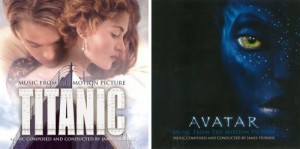
TITANIC and AVATAR soundtracks | ©2016 Sony Classical Records
AX: What was it about your music that brought you to James’ attention? And how did you fit into his musical team?
FRANGLEN: Although I’d met him on a couple of singles before, my first real work collaboration with James was on TITANIC. The synth team was James, me and Ian Underwood, synthesist and James’ long-time collaborator, who is one of the great heroes of film music as far as I am concerned. I brought something different, perhaps a little more record based. I think that difference between us helped the score’s feel.
AX: What were some of your memorable experiences coming up with James on scores like TITANIC and AVATAR, and how do you think they helped your grow as a composer? And conversely, what do you think you brought to James’ scores in your time together?
FRANGLEN: TITANIC was the score with no money, hard to believe but true. I was brought in initially to create the “mock orchestral” elements, but that role evolved into sequencing and recording all the synths for the score in a studio out in Calabasas. I remember borrowing gear from manufacturers to try to save money. There was a cramped control room, with Underwood, Horner, Franglen in a line and regular visits from Jim Cameron who would squeeze in between whilst we played him cues and he would make changes.
AVATAR was a different beast, I’d moved to the UK for family reasons when I got a call asking if I’d like to come and see five minutes of something. James showed me the first 3D footage of AVATAR. It was a no-brainer to say yes. We spent close to a year being challenged by Jim to give him the score that he needed.
James gave me a free hand to arrange the electronic elements and the rhythmic soundtrack to the film. I still take pride in things like the sound and feel of the glowing forest, or the rhythms and non-orchestral textures of “Jake’s First Flight.”
Overall I think I brought a more contemporary edge to James’ work. Years of producing records from R&B to classical and my happiness with technology has given me a set of tools that extends outside pure scoring. I would also challenge him to work in different ways, perhaps pulling James outside his comfort zone.
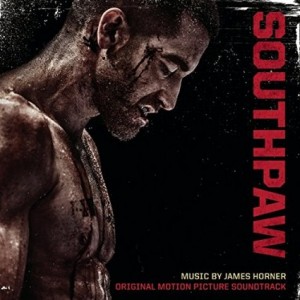
SOUTHPAW soundtrack | ©2016 Sony Classical
AX: What was your experience like working with Antoine Fuqua for the first time on SOUTHPAW? Given how necessarily moody and synth spare that the music was, was there the anticipation of doing a truly fun “old school” score for THE MAGNIFICENT SEVEN?
FRANGLEN: SOUTHPAW was a score I urged James to chase when it first came on the radar. The urban electronica was like breathing for me but importantly it felt like another good way of challenging James to push himself into new territory with a new director. The budget was microscopic, which also meant that James had to think differently. Once we were in the score, we immediately knew that Antoine was special. He had a deep love and understanding of music, a willingness to change his mind and a great set of ears. Constantly he’d find a texture or a line in a cue and say, “That’s it, that should be the sound of…”, something thrown in as ear candy became an integral part of the score.
James, Simon Rhodes and I talked at length about THE MAGNIFICENT SEVEN while we were working on SOUTHPAW. James was worried that it could be a poisoned chalice. How do you ever beat Elmer? Ultimately it was an easy decision to make. After all, it was a cowboy film. We all dream of scoring a cowboy film.
AX: What was your initial collaboration like on the score? How far did you “map” it into the future?
FRANGLEN: James came to London and he worked on themes for the film with me and Rhodes for a week as he prepared to record “Collage.” This was a normal occurrence, we would usually meet to work through themes and discuss how the films should be arranged and feel. We had a very full schedule over the coming years and the time crunch meant that he wanted to get some material in front of Antoine sooner rather than later.
AX: After James’ death, did you think there was a chance his MAGNIFICENT SEVEN would ever make it to the film, becoming a concert piece instead? Or was it always a given that his music would be saved and adapted? In that sense, was it a mission of you all to fully realize the score?
FRANGLEN: After James’ death, we were devastated. I couldn’t just let James’ final compositions disappear. In talking with the other members of the team, Jim Henrikson, Joe E. Rand, J.A.C Redford, they were unanimous in encouraging Simon Rhodes and me to complete a suite of themes that could be presented to Antoine. Two weeks later, I was in Louisiana playing the music to an astonished director from his friend.
AX: Given the practically all major scores are done to picture, what was the extent of the “configuring” that you had to do to with the themes to work to make it into a true score?
FRANGLEN: If you plant an acorn, you’re going to get an oak tree, but of course environment matters will affect how that tree grows. The nature of a 107-minute score is that it evolves with the edit in the same way and obviously this was no different.
AX: What was it like for you to take on this kind of gargantuan task you never expected? Was the confidence always there that you and the team could pull it off?
FRANGLEN: I never doubted it. We have the best team in the world, bar none, with experience of hundreds of scores. It is extremely important that I highlight Simon Rhodes’ writing and arranging, in addition to his engineering and mixing. He’s utterly awesome at all of them. Since I had produced scores and arranged for James for several years, handling multi-million dollar budgets and production challenges was normal. As the long as the music wins, I’m always happy.
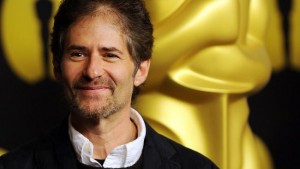
THE MAGNIFICENT SEVEN co-composer James Horner | ©2016 James Horner
AX: What do you think makes a James Horner score? And how did you get inside of James’ “head” to write so well in his “voice” as it were?
FRANGLEN: James was the master of the emotional arc within a score and a film. That sense of themes and arrangements that evolve with the characters. His ability to reflect the heart of the film was unparalleled. We’d all worked with James for so long we breathed his style, so combining where he started with the direction changes that post production bring to any project was never going to be difficult. Ultimately the most important thing was that Antoine got the score he needed.
AX: When you visited the set, what was it like playing the themes to Antoine? And how did being on location give you an idea of where to take the score?
FRANGLEN: It was an emotional moment for us all as you can imagine. He was extremely moved by this gift from his friend, it meant a lot to him. Antoine was on that set in Louisiana largely because of James’ urging that he should make the film when he was considering moving to another project. Being there was crucial, it allowed me to understand the detail, the sweat and especially the grit that was in the film. You are surrounded by hundreds of extras, horses, dust, and noise. That takes you to the place and time better than just the pure image.
AX: The score has all of James’ trademarked bells and whistles in terms of its ethnic instrumentation, vocals and symphonic power. Could you talk about how it was orchestrated?
FRANGLEN: Giving the score a balance between the classic western orchestra and a contemporary grit and rhythmic sense was crucial to reflecting Antoine’s film. The score needed to be based in the dirt of the west; chuggomatics and a DX7 don’t quite give you that. It needed cinemascope; we recorded the 80-piece orchestra in the whole, rather than striping different sections, you lose so much of the unity of sound when you split the sections. Many of the ethnic elements came from Antoine’s urging. He was referencing James’ “Thunderheart” often and that really helped define those textures. I wanted to find an organic way to give the rhythmic and contemporary feel that a modern score needs, so we used live instruments, acoustic baritone guitars and guitarróns, disgruntled banjos and distressed qenas, rather than anything electronic for the vast majority of the score.
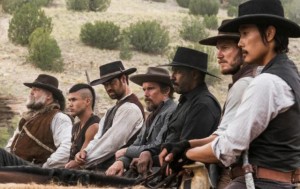
THE MAGNIFICENT SEVEN | ©2016 Sony Pictures
AX: What do you think makes a great western score? And what are the ones that have always stood out for you? And how would you say the genre has changed in between the time of THE MAGNIFICENT SEVEN and this new version?
FRANGLEN: A displaced European neo-classical composer is usually a prerequisite. There’s a need to get the sense of the hero and the land. Westerns give you so much more room, both spatially and effects-wise. There are no helicopters, tanks or robot wars that limit how you can write. Even horse hooves are relatively kind to your mix. In choosing my favourite western scores, can we presume I throw in Jerome Moross’ THE BIG COUNTRY, Dmitri Tiomkin’s RED RIVER and THE WAR WAGON, etc… For my Saturday afternoon fix, the ones I’d hug closest would be Elmer Bernstein, Ennio Morricone’s ONCE UPON A TIME IN THE WEST and John’s DANCES WITH WOLVES obviously. For the new MAGNIFICENT SEVEN we wanted to find a home for Elmer’s original theme, but as we tried it became evident that it felt anachronistic within the body of the new movie. Films are so much wider, deeper, grittier and louder than then, arrangement styles have changed and whether we like it or not scores have to reflect the films they inhabit. The solution is not dissimilar to Michael Giacchino’s use of Alexander Courage in STAR TREK. It’s an essential item. Fuqua has made a different film to what John Sturges did, but we still need to remember the master.
AX: How would you describe Elmer Bernstein’s MAGNIFICENT SEVEN’s place in the western soundtrack cannon? Did you want to give a tip of the hat to Elmer’s iconic theme without actually using it?
FRANGLEN: From the outset, James wanted to have a score that felt related to the Bernstein. I think we found a way to tip the hat that pays respects to the boss.
AX: What kind of “cool” do you think Denzel Washington and Chris Pratt bring to the score?
FRANGLEN: A man in black rides into town on a black horse packing two silver six guns, Denzel couldn’t fail to be cool if he tried. Add Chris Pratt, who couldn’t fail to be charming and it’s a match made in heaven. Add five exceptional actors to make up the seven and you have something pretty damn special. In one cue in particular, “Seven Angels of Vengeance, we tried it a couple of ways, one as you hear it now and also as a lighter heroic version. It was no contest, the grit and swagger” needed to come through in the first gunfight, these men are dangerous to know. The score needed to reflect that.
AX: How did you want to personify each of the heroes? Were there ones that musically stood out for you?
FRANGLEN: Mostly it was case of playing the emotions rather than the surface layer. With nine main characters, you can get carried away with trying to give each their own leitmotif. There are a few that we tried to incorporate: a Baritone guitar twang when Denzel spins his guns, a nod to Jerry Goldsmith with the echoplex voices and trumpets, the handclaps and men humming. My favourite would be the disgruntled banjo that took almost a week to refine. I used this as part of the villain Bogue’s theme; it needed to hypnotise and unnerve you. It involved distressing a banjo and then sending it into rooms and surround echoes to build the musical equivalent of finger nails on a blackboard. I was pleased with that.
AX: Was it particularly fun to play the ethnic characters of an Indian and a Chinese assassin?
FRANGLEN: We weren’t trying to hit ethnic music directly but Antoine had specific ideas about how we played Red Harvest’s initial appearance and that guided the score there. As I said earlier, Antoine was referencing “Thunderheart” and that brought in many of these textures. As far as Billy Rocks goes, he’s just waaay cool. After my time in China for James WOLF TOTEM last year I’d become very taken by Mongolian instruments. Perhaps Billy rubbed off subconsciously in my instrument choices, for one action cue I based the groove around a rhythm I asked George Doering to play on a Moorin Huur.
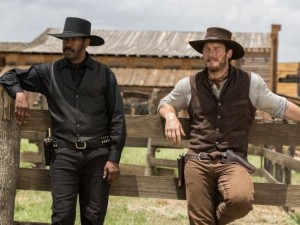
THE MAGNIFICENT SEVEN | ©2016 Sony Pictures
AX: How did you want the score to unite these disparate characters to thematically team up into a singular fighting force by the end?
FRANGLEN: If I learned one thing from James, it was that a score has to evolve with its characters. These men, who don’t know each other, have no links to what they are fighting for, end up trying to save a town they have no stake in, they become true heroes. The score needed to reflect the heart and soul of these men as they fight together. That can only be done using long thematic cues with an orchestra at the top of its game.
AX: How did you want to musically personify the villains?
FRANGLEN: I mentioned the disgruntled banjo earlier, however Bogue’s theme is a violin line I wanted to weave its way through the scene like a snake. I use it throughout the film as the personification of evil. Where most of the western colours and themes are more evolved, this was primary, dark and empty; very little counterpoint, very little embellishment; the character of the man and his henchmen.
AX: What were the most challenging sequences of the film for you?
FRANGLEN: Undoubtedly the final battle, I wrote much of the final reels as a series of four connected cues across about fifteen minutes. Getting the thematic and emotional arc across the entire battle whilst still retaining a contemporary feel to an action cue was key to the process. That may be difficult to hear on the album, as like elsewhere in the CD, the cues have often been split into smaller pieces, as we had to discard so much of the 107 minutes just to get what we could fit on the album.
AX: Though THE MAGNIFICENT SEVEN is most definitely an uptempo, 21st century western, the score has a great, muscular “old school” sound to it. Do you wish there was more of that kind of unabashedly orchestral scoring going on now?
FRANGLEN: Damn right. The sound of 80 people breathing in and out, giving of themselves and their talent to bring your music to the screen, there is nothing finer. Orchestras and orchestral writing are the heartbeat of film. I think that often film producers do themselves a disservice by failing to grasp that. They forget that four chords played in repeating sequence, tutti, fff with the ‘blastomatik epic’ patch in D minor for ten minutes does not always an Oscar™ winner for best score make.
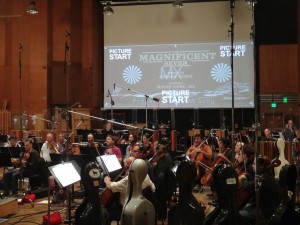
THE MAGNIFICENT SEVEN scoring session | ©2016 Simon Franglen
AX: What was the mood like at the recording sessions? Do you think the musicians felt that they were making history, as well as providing the last notes of it?
FRANGLEN: Love, genuinely. At the beginning we all took a minute of silence for James, a man that many of us had known for two to three decades, a man who was as full of love for the musicians in that room as they were for him. He was never happier than on the stand with his band. This was a labor of love for all concerned and you can clearly hear that sense of community between everyone in the recording. They wanted to do their very best for their departed friend.
AX: Given that this score is truly James’ last ride into the sunset, how do you think his MAGNIFICENT SEVEN will be remembered? And what do you think it will be like for his fans to hear him come alive here with such resonance?
FRANGLEN: I hope they look at this as a fitting eulogy for a man who loved film scores with such passion and gave so much to the art. I think a cowboy film is exactly the right film to end on for the reasons you put so eloquently in your question. He rode off into the sunset.
AX: Your next score will be for Terrence Malick’s documentary THE VOYAGE OF TIME. Given that James didn’t have the best experience on THE NEW WORLD with him, how do you think you’ve personally found the key to the kind of music that Terrence likes? And given how long this project has been in production for, how has your score developed with it?
FRANGLEN: About six months ago, an avant-garde piece of pure music I’d written was given to Terrence by Richard Bernstein, his music editor and my friend and collaborator on any number of films, including AVATAR. I got a call from Dick saying “Terry wants to talk to you” and he handed the phone over. Terrence had a very specific idea about how intervals and changes could be used musically within the score that he wanted to weave. I was asked to write about thirty different four to six minute pieces, for various ensembles, some string, some vocal, woodwind and some synthetic that reflected his thoughts. He and Dick then weaved my music in with other elements, as has been his process as far back as BADLANDS. I know I’m in good company, Bach, Mahler and Poulenc amongst others. More recently I was given picture to score directly to, which has been utter joy. Writing counterpoint to a virus is not something you do every day. I can’t stop gushing about the images and the way he winds the storyline through the picture. It’s a film to immerse yourself in, almost like the Laserium experiences of old. Look up at the screen and gaze in wonder at the universe.
AX: How important is it for you now to step into your own place, and voice as a film composer? And what can people expect from it?
FRANGLEN: I hope that in the coming years I can remind people that machines can breathe and flow as well as groove in 4/4, that orchestral writing is not a box of samples playing at full volume, that emotion in music is a good thing and most importantly, themes are not old fashioned. Finding the soul of a film in the score is what I love to do.
THE MAGNIFICENT SEVEN opens on September 23, with James Horner and Simon Franglen’s score released by Sony Classical HERE
Listen to Simon Franglen’s score for “The Voyage of Time” when it soars onto Imax screens October 7th
Visit Simon Franglen’s website HERE
LEAVE A COMMENT BELOW AND LET US KNOW WHAT YOU THINK!
Follow us on Twitter at ASSIGNMENT X
Like us on Facebook at ASSIGNMENTX
Article Source: Assignment X
Article: Interview: THE MAGNIFICENT SEVEN composer Simon Franglen on finishing James Horner’s last score
Related Posts:




